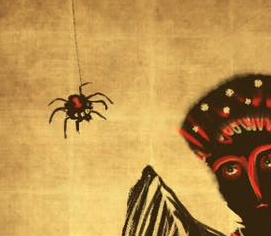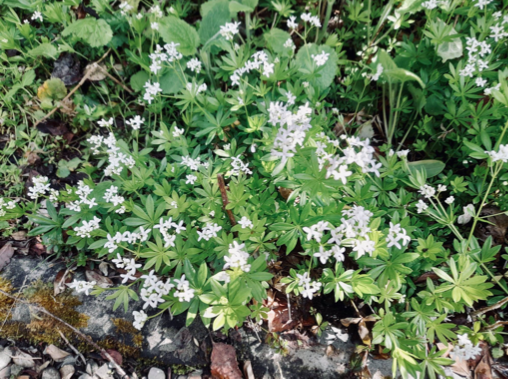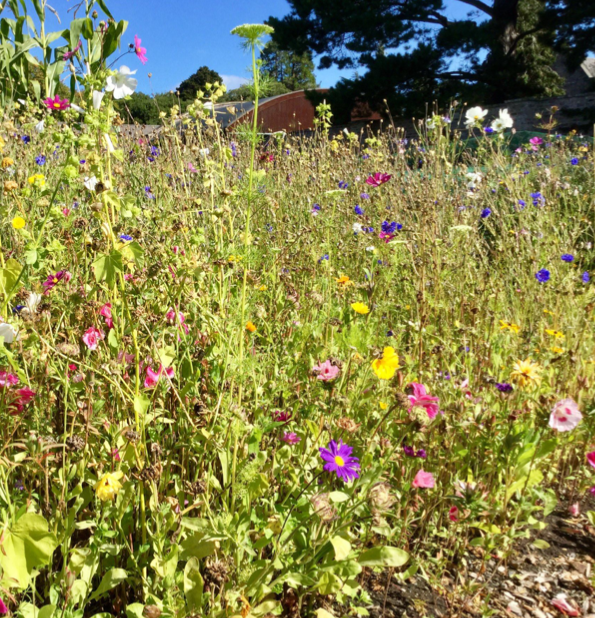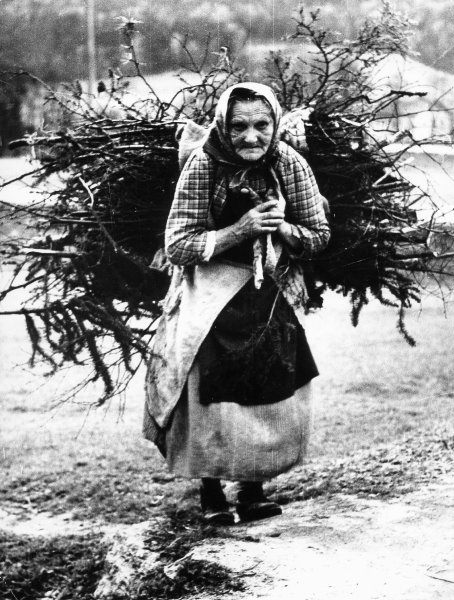WRITING
I have always written; diaries and bad poetry - as you do - when young, collaborated on TV scripts when older, a libretto for an opera (Vagabones, 2019, by Raymond Deane) later, and currently creative short non-fiction. As a professional gardener, I naturally gravitate towards writing about gardening, with a particular interest in nature and wildlife, but also encompassing history, myth, etymology and poetry.
I also write short vignettes drawn from my childhood in a small village in post-war Germany, its microcosm of characters and stories of a very particular time and place. And there's a whole collection of short and wry pieces I call 'Short Fuse - Little Lives'.

Do spiders have ears? (Little Lives)
Two small spiders have taken up residence in my bathroom. They must be the same species for I can see no difference between them, even when I inspect them with a magnifying glass. Such are the things I do in my spare time.
They
may look identical, but boy do they have different personalities!
Reckless, who lives above the bath, shows neither fear nor sense.
When I take a shower it emerges to race around in mad circles on the
tiles, always just a thread away from slipping into the suds and
certain death below. Other times it will brazenly abseil in front of
my face as I wash my hair. Quite the daredevil, or should that be
half-wit?
Occasionally
on its nightly adventures it gets itself trapped in the bathtub and I
have to help it out of there. Putting it back into its corner I
admonish it to be more careful next time, but this obviously goes in
one ear (do spiders have ears?) and out the other.
The
other lad, Timid, lives behind the toilet cistern, and it, too,
appears when I shower. Cautiously it will creep out a short distance
from its hiding place and scuttle over to a droplet of condensation.
It takes what I imagine are a few quick gulps then beats a retreat
back into its haven behind the cistern
Sometimes,
on a generous impulse, I put a drop of water into its path so that it
might have an easier time slaking its thirst. But on seeing my hand,
or sensing the plop of the liquid, it immediately turns tail and
hastily disappears down the narrow crack that is its home. Don't be
such a wimp, I mutter, rather aggrieved that it does not trust my
benign intentions.
What different universes they inhabit; what strange worlds coexist in my bathroom! One an adventure playground with a friendly giant on hand for rescue from sticky situations. The other a terrifying wilderness complete with a looming ogre throwing water bombs.
I'll
let you be in my world, I say to both of them, if I can be in yours.

Schooldesk (Little Lives)
How much is the desk? I asked the man dozing in an ornate armchair beside the door. He opened one eye under his cloth cap. Thirty. Isn't it beautiful?
Thirty
euro for an old folding school desk! Look, one of the legs is broken,
and the other one is coming apart at the joint. Twenty, I offered,
max. He was indignant. It just needs a bit of glue. They're rare,
those desks; antiques, so they are. Sure, where would you get another
one like it?
For
someone on my budget I'm not much use at haggling, and he saw right
through me. My twenty-five euro safely in his pocket, he
reconsidered. Would I be interested in a few more of these? Ah, but
where, I wondered aloud, would you get another one? Easy, said he, I
can buy them from England by the dozen.
The desk
folded small enough to get on the bus with, even if its gammy leg
kept falling off. At home, I looked it over. It had quite a
collection of antique chewing gum stuck to the underside.
Just as timeless are the words scratched into the top. A despairing, jittery I AM FUCKED here, I LIKE PIE there, and in one corner a silent cry for MUM. Bold I LIKE BAR BREST shows either an early alcoholic tendency or a lewd disposition crossed with an ignorance of the basics of English spelling. There are hearts around initials and a few attempts at obscene drawings that betray a touching innocence about female anatomy.
This is
what I love about old things: their existence independent of me, the
marks they bear that tell a half-guessed story about their past. I
come into this desk's life much as it has come into mine. New and
pristine once, probably around the same time I was, it has been
around a few blocks and had a few knocks. Where are the children now
who scratched into its top? Sure, where would I get another one like
it?

Woodruff (Gardening)
On woodland floors and in shady garden corners a little plant creeps around which goes by the most grandiose names: Waldmeister (master of the forest) in German, and Queen of the Woods (Reine des Bois) in French. This is sweet woodruff, or galium odoratum.
In bloom, its delicate star-shaped flowers of pure white
stud the fresh green carpet of soft low stems and tiered whorls
of narrow leaves. A native plant loving shade and moisture, it
spreads both by root and clingy seeds and quickly covers areas under
trees and shrubs. In the garden it makes a low, evergreen,
unobtrusive if rather invasive ground cover for shady areas.
It
is its scent which earns it those grand names: sweet, grassy, with
notes of vanilla, becoming strong only as the herb dries. The Germans
are particularly fond of it, flavouring sweets, ice-cream, jellies
and liqueurs with it. Berliner Weisse is a beer that despite the
'white' in its name comes only in raspberry red and green, the
latter via the addition of woodruff syrup. And then there is the
famous Maibowle (May punch), a lime green concoction of wine,
champagne and herbs, the main one of these being Waldmeister. When I
was a child you could be sure that any sweet that was green was of
woodruff flavour. We generally disliked it but ate the sweets
regardless, sugar trumping any other flavour.
'Lady's
Bedstraw' is its common name in English, referring to the fact that
the plant was one of the herbs added to the materials – mainly
straw – used to stuff mattresses and pillows for its pleasant
scent, and possibly also to keep moths and other insects away.
Like
almost all aromatic herbs, woodruff has also been used medicinally in
the past. Its mildly antispasmodic and anti-inflammatory properties
have been used in folk medicine against all manner of ills including,
naturally, witchcraft and the evil eye. Cumarin, the natural compound
that gives the herb its flavour and fragrance, is also mildly toxic,
which led to natural woodruff being banned as an additive to many
food products, particularly those eaten by children. It is now
usually replaced by an artificial substitute, or else strict limits
apply to its commercial culinary use.
In
their homes, though, Germans still brew Maibowle with the real stuff
gathered from the woods. Its main toxic effect appears to be a
headache, making it a handy culprit. Someone must have put too much
Waldmeister into that punch...

In praise of weeds (Gardening)
Weeds are pioneers, weeds are colonisers, weeds are rescuers. They are nature's first aid, arriving quickly after fires and floods to stop erosion, create shade or new topsoil and make the ground hospitable for larger vegetation and future forests. Their seeds parachute in on the wind, travel on the pelts of animals or in the stomach of birds. Tough, frugal and well equipped with strategies for spreading and taking over – albeit temporarily – they will hold on tenaciously, sprawl about like bullies and reproduce quickly and prolifically.
Nature knows no weeds. It simply abhors a vacuum and will stuff any bare patch with those pioneers and colonisers. Some militant natural gardeners also know no weeds, because they object to the term outright. One man's weed will always be another woman's wildflower.
Peasants know their weeds. Proliferation of weeds may lessen their food crops and make them go hungry next winter in the absence of shops or money. They would also know about their medicinal properties and how to brew infusions in the absence of doctors and hospitals. 'Ecology' was not a concept to my peasant ancestors but the sparkle of blue cornflowers and red poppies in the rye fields of my childhood was not just pretty, but supported an abundance of pollinators and insect life, though not an abundance of joy for us children, who spent summer days hand-hoeing seemingly endless potato fields.
Today's agro-industrial complex, in thrall to monoculture and military-style machinery, hates all things wild and has made poisons to throw at those 'weeds'. No more marguerites or ragged-robins or little fields bordered by wildflower hedgerows but huge expanses of ecological desert. Ah, but weeds are resilient and some have become resistant. Now what – more poison?
"A weed is any plant in the wrong place", some gardeners say, giving as good a definition as any. Pull up the unwanted by all means as they will compete with your more precious flowers or your food crops. But leave a few wild things here and there, leave some areas of long grass and see what happens, tolerate a few daisies and clovers in the lawn, and those nettles beside the shed, for all our sakes.
In good conscience what can we call weeds? Newly introduced species maybe – Japanese knotweed or giant hogweed & co – which spread rapidly, displace native flora and the insect fauna that depends on it? But so many plants that pollinators love in gardens and in the wild were introduced not so long ago. Local fauna may well develop a taste for those invaders as they become integrated in the food chain. What do we know, really?
Weeds are the vanguard of the forces that will obliterate our ugly traces. They will take down our shining cities and carpet our motorways in the blink of an eye, given half a chance. Look at those little plants sprouting from tiny cracks in city pavements. They are waiting. We may not, but they surely will adapt to the worst that climate change can throw at this planet. They give me hope, "hope enough, endless hope – just not for us".
("Hoffnung
genug, unendlich viel Hoffnung, — nur nicht für uns." - Franz
Kafka)

GERTRUD
In old family photographs I sometimes catch a glimpse of her: a stolid, middle-aged woman always in the background or at the margins. All that remains of her life now is in a small cardboard box in my sister's attic: some papers, postcards, photographs, a bible. This is Gertrud.
Tante Trude, as we called her, was a fixture of my childhood. In summer we accompanied her into the woods to pick berries. In winter she let us ride on her small hand cart as she gleaned pine cones and twigs for firewood. She helped at harvest times, raking hay, picking hops and digging potatoes, usually relegated to doing the simplest tasks along with us children.
Gertrud loved us and we took her for granted as children do. How fortunate we must have seemed to her: growing up in a time of peace and safety, with an education open to us, our carefree adolescence, our freedom to decide our future. My sister Anna was the one she loved most, treasuring her postcards and photographs, proud as a mother of her achievements.
Born in 1911 in Breslau – now Polish Wroclav – then the capital of the province of Lower Silesia and a prosperous, picturesque city, Gertrud grew up during the First World War. Her family were landless peasants, she a plain girl and a slow learner. She left school at 15 and worked in factories or as a maid.
In 1944 Hitler declared the city of Breslau a fortress against the advancing Russian army and in January 1945, in the middle of an icy winter, ordered the civilian population to leave. Gertrud accompanied her elderly aunt and uncle on this march, while her mother and sister were due to follow a few days later. She would never see them or her home town again.
Sometime in the early 1950s Gertrud and her aunt and uncle arrived in our village in Bavaria. Refugees from the expulsions of ethnic Germans from Poland, Czechoslovakia and Romania, nine million in all, were flooding into every town and village in West Germany. Even our tiny hamlet of a dozen farms saw th arrival of three families.
There was a small two-room cottage on our farm where Gertrud lived and cared for her aunt and uncle. It had earthen floors, no running water and her room was tiny and unheated with just a single bed, and a dresser for her few belongings. On the wall was one small picture of two women, her only photograph of her mother and sister. The native villagers, still traumatised by the war, treated the new arrivals with a reserved kindness accorded to those whose suffering surpassed their own. But they remained outsiders, 'refugees', their lost world and its memories of little meaning to those around them.
After her aunt and uncle died in the mid-60s it was decided that Gertrud should live with my widowed uncle in another village as his companion and housekeeper. With no family and only a tiny refugee pension, what choice did she have? So she swapped one damp old cottage for another much the same and the company of uncle Adam, a good-natured man, but simple, with a gruff and insensitive manner. He made fun of Gertrud's strong Silesian accent, her cooking, her clumsiness. She talked of Breslau more and more, and wept.
She never stopped searching for her mother and sister, faithfully studying the lists of names and photographs published by the Red Cross, who had taken on the gargantuan task of trying to reunite families separated during the chaotic flight westward at the end of the war. Most likely they were among the many who died in the bitter cold during those long marches, or they may have made it to Dresden, only to die in the bombing and firestorms of that city a few weeks later.
It was my sister's name she called at the end, over and over as she lay semi-conscious in a hospital bed, dying of a cancer diagnosed too late. But Anna, away at university by then, came too late. Gertrud had fallen into unconsciousness and died that night, alone, at the age of 66.
Of those who live through the maelstrom of history's monstrous and momentous events, some fall on their feet, some get crushed and yet pick themselves up again. But there are also the Gertruds, the survivors whose lives become forever broken by displacement and loss; who are too damaged to pick up the pieces, or just not tough or able enough. When I look at the news now, with its endless footage of war and human misery, among the streams of refugees carrying bundles, among the bewildered or resigned faces in refugee camps, I still see Gertrud